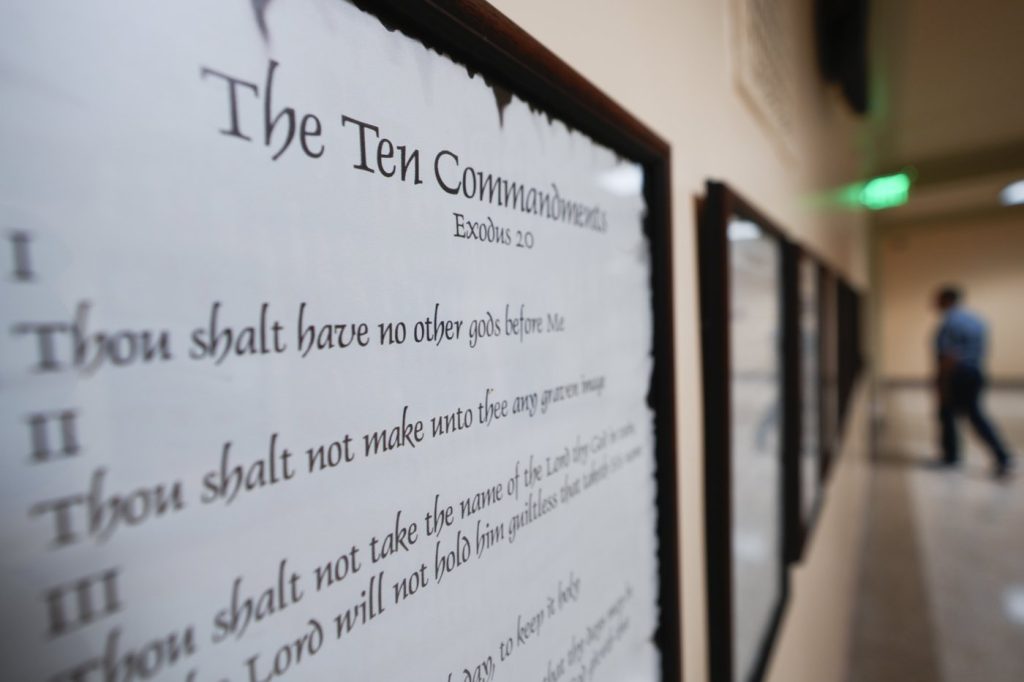Conservative lawmakers in the U.S. are increasingly advocating for the introduction of more Christianity into public school classrooms, raising questions about the separation of church and state. This movement includes the integration of Bible references into reading lessons and the requirement for teachers to display the Ten Commandments in classrooms, reflecting a significant shift in educational policies in several states.
This push comes in the wake of President-elect Donald Trump's commitment to champion the First Amendment rights related to prayer and Bible reading in schools, practices that are already permissible as long as they are not government-sponsored. While the federal government is explicitly barred from dictating educational content to states, Trump's election may empower state-level activists to promote these changes.
Trump, along with Republican supporters, is backing school choice, aiming to expand the usage of taxpayer-funded vouchers for families to send their children to religious institutions. However, there is also a concurrent effort to weave Christianity more firmly into the fabric of public education, potentially impacting the vast majority of students, including those from diverse faith backgrounds.
The influence of Trump's judicial appointments has already begun to affect court rulings in favor of increased religious expression in public schools, thus encouraging conservatives to instigate a more pronounced presence of Christianity in classrooms. Rachel Laser, the president and CEO of Americans United for Separation of Church and State, noted that “the effect of even Trump being the president-elect, let alone the president again, is that Christian nationalists are emboldened like never before.”
Many Americans hold the belief that the founders intended for the U.S. to be a Christian nation. A segment of the population, identified with the Christian nationalism movement, advocates for a blend of American identity and Christianity, asserting that the nation carries a divine mandate to establish an explicitly Christian society. In contrast, numerous historians argue that the nation was founded as a refuge from European monarchies with official state churches, designed to protect religious minorities.
Efforts to infuse more Christianity into education have gained traction in several states. In Louisiana, lawmakers have passed legislation mandating that every public school classroom display the Ten Commandments. Similarly, officials in Texas have approved a curriculum that intertwines language arts with biblical lessons, resulting in ongoing litigation from families opposing such measures. In Oklahoma, the state superintendent has advocated for the inclusion of the Bible in lessons for students in grades 5 through 12, although many schools have resisted this directive.
Utah legislators have similarly designated the Ten Commandments as a historic document, allowing educators to showcase it alongside other foundational texts like the Declaration of Independence. Other states are also seeing legislation aimed at increasing the presence of biblical references in educational settings, with 17 attorneys general from GOP-led states supporting Louisiana's initiative.
While schools are encouraged to teach about religion and include religious texts in their curricula, critics, including scholars and educators, argue that these new measures risk indoctrinating students rather than providing a comprehensive education. The critiques extend to the use of resources like PragerU’s videos, which have been criticized for promoting Christian nationalist ideologies.
The controversial 1776 Project, developed during Trump's presidency, attempts to promote a patriotic interpretation of American history, has also stirred debate. Critics assert that it overlooks Christianity's darker legacies, such as its role in perpetuating slavery.
Legal challenges to recent state laws are ongoing, particularly as courts display an increasingly favorable stance towards religious interests, influenced by Trump's judicial appointments. A pivotal Supreme Court ruling in 2022 favored a football coach in Washington who was dismissed for praying on the field, marking a significant departure from previous legal principles regarding church-state separation.
In summary, the recent trend towards incorporating Christianity into public school systems reflects a broader cultural push fueled by political and judicial forces, igniting debates about the implications for educational content and religious freedom in America.










